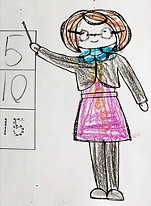The surprise exam
Preface
 This was written in 2009. I explain why I think the surprise exam paradox is just a subtle version of the paradox of the heap. This was not easy to figure out because this is one of the most confusing paradoxes in the world.
This was written in 2009. I explain why I think the surprise exam paradox is just a subtle version of the paradox of the heap. This was not easy to figure out because this is one of the most confusing paradoxes in the world.
 This was written in 2009. I explain why I think the surprise exam paradox is just a subtle version of the paradox of the heap. This was not easy to figure out because this is one of the most confusing paradoxes in the world.
This was written in 2009. I explain why I think the surprise exam paradox is just a subtle version of the paradox of the heap. This was not easy to figure out because this is one of the most confusing paradoxes in the world.
5. The birthday party
Suppose that your friends have organized a surprise party for your birthday tomorrow and excitement is in the air. Thrilled by the activity, your little niece innocently rushes to tell you all about it.
Do you now know that a surprise party awaits you tomorrow?
Clearly, your “knowing” about it has thwarted its very occurrence and so you can no longer be said to know that a surprise party will occur. A birthday party may still occur, of course, but not a surprise one.
This is a simple case of a self-defeating announcement. Your niece’s announcement was meant to inform you of the surprise party but it stands no chance of doing that. Letting you “know” of the event ensures that the event can no longer occur.
This case is a useful model because the student is claiming that the teacher’s announcement (of a surprise exam next week) defeats itself in a similar way. Its ostensible purpose is to inform the class of the upcoming surprise exam but, if the student is right, it cannot succeed in doing that. Letting the class “know” of the event ensures that it can no longer occur.
Of course, the case of the exam is more complex than the birthday case above and it is far from apparent that the teacher’s announcement defeats itself in a comparable way. Nevertheless, that is the broad charge and we’ll see below that there is actually something to it! For the moment, let’s consider the birthday case a little further.
 Notice that your niece’s “announcement” was not really essential to it.
Notice that your niece’s “announcement” was not really essential to it.
You couldn’t likewise discover (on your own) that you were going to have a surprise party. You could discover that one was being planned, but not that one was going to occur.
The essential point is that you cannot know that you are going to have a surprise party, whether through an announcement or otherwise. As before, this doesn’t mean that the surprise party (itself) cannot occur. What’s impossible is only your knowing the proposition that it was going to occur.
A proposition of this sort, which could possibly be true, but cannot possibly be known to be true, is sometimes called a “blindspot,” a useful term coined by the American philosopher Roy Sorensen.
Notice that a proposition may be a blindspot for a specific person, or select group of people, but not necessarily for others. Thus, the proposition that you are going to have a surprise party is a blindspot for you, though not for anyone else. Your friends could know that you are going to have a surprise party; it’s just you that cannot know it.
Another example is this:
 A third example, from the English philosopher G. E. Moore, who first discussed such cases, is this:
A third example, from the English philosopher G. E. Moore, who first discussed such cases, is this:
Getting back to our paradox, the teacher announced that a surprise exam would occur next week and the student claimed that her announcement was self-defeating. An equivalent charge is that her announcement is a blindspot for the class. Thus, although her words may be true, the class cannot know them to be true. For our purposes, this would be the same charge.
Is the charge correct?
In the birthday case above, the charge is certainly justified, as we saw. But that case was also relatively simple, involving a surprise event that was to occur on a specific day – your birthday.
involving a surprise event that was to occur on a specific day – your birthday.
The case of the exam, in contrast, involves five days, on any of which the exam might fall, and so the two cases are not obviously comparable. Nevertheless, the student claims that, when carefully considered, the teacher’s words prove to be as self-defeating as those of your niece.
To see the force of his charge, we should start by studying the simple “one-day case” where the teacher makes this curious announcement to the class:
Indeed, the student means to take this as a base case and build up gradually to the five-day case with which we began. But we should really start with the one-day case.
Suppose that your friends have organized a surprise party for your birthday tomorrow and excitement is in the air. Thrilled by the activity, your little niece innocently rushes to tell you all about it.
Do you now know that a surprise party awaits you tomorrow?
Clearly, your “knowing” about it has thwarted its very occurrence and so you can no longer be said to know that a surprise party will occur. A birthday party may still occur, of course, but not a surprise one.
This is a simple case of a self-defeating announcement. Your niece’s announcement was meant to inform you of the surprise party but it stands no chance of doing that. Letting you “know” of the event ensures that the event can no longer occur.
This case is a useful model because the student is claiming that the teacher’s announcement (of a surprise exam next week) defeats itself in a similar way. Its ostensible purpose is to inform the class of the upcoming surprise exam but, if the student is right, it cannot succeed in doing that. Letting the class “know” of the event ensures that it can no longer occur.
Of course, the case of the exam is more complex than the birthday case above and it is far from apparent that the teacher’s announcement defeats itself in a comparable way. Nevertheless, that is the broad charge and we’ll see below that there is actually something to it! For the moment, let’s consider the birthday case a little further.

You couldn’t likewise discover (on your own) that you were going to have a surprise party. You could discover that one was being planned, but not that one was going to occur.
The essential point is that you cannot know that you are going to have a surprise party, whether through an announcement or otherwise. As before, this doesn’t mean that the surprise party (itself) cannot occur. What’s impossible is only your knowing the proposition that it was going to occur.
A proposition of this sort, which could possibly be true, but cannot possibly be known to be true, is sometimes called a “blindspot,” a useful term coined by the American philosopher Roy Sorensen.
Notice that a proposition may be a blindspot for a specific person, or select group of people, but not necessarily for others. Thus, the proposition that you are going to have a surprise party is a blindspot for you, though not for anyone else. Your friends could know that you are going to have a surprise party; it’s just you that cannot know it.
Another example is this:
Smith is a spy but his parents will never find out.
This could be true but Smith’s parents could not know it! The proposition above is a blindspot for Smith’s parents, though not for anyone else.
It’s raining outside but I don’t know this.
Obviously, this proposition could be true but, equally obviously, I could not know it to be true. This proposition is a blindspot for me and me alone.Getting back to our paradox, the teacher announced that a surprise exam would occur next week and the student claimed that her announcement was self-defeating. An equivalent charge is that her announcement is a blindspot for the class. Thus, although her words may be true, the class cannot know them to be true. For our purposes, this would be the same charge.
Is the charge correct?
In the birthday case above, the charge is certainly justified, as we saw. But that case was also relatively simple,

The case of the exam, in contrast, involves five days, on any of which the exam might fall, and so the two cases are not obviously comparable. Nevertheless, the student claims that, when carefully considered, the teacher’s words prove to be as self-defeating as those of your niece.
To see the force of his charge, we should start by studying the simple “one-day case” where the teacher makes this curious announcement to the class:
There will be an exam tomorrow but you don’t know this.(“There will be a surprise exam tomorrow.”) In this strange case, her announcement is easily shown to be self-defeating, i.e., a blindspot for the class. Although her words may be true, the class cannot know them to be true. This case proves easily assimilable to the birthday case above.
Indeed, the student means to take this as a base case and build up gradually to the five-day case with which we began. But we should really start with the one-day case.
Menu
 What’s a logical paradox?
What’s a logical paradox? Achilles & the tortoise
Achilles & the tortoise The surprise exam
The surprise exam Newcomb’s problem
Newcomb’s problem Newcomb’s problem (sassy version)
Newcomb’s problem (sassy version) Seeing and being
Seeing and being Logic test!
Logic test! Philosophers say the strangest things
Philosophers say the strangest things Favourite puzzles
Favourite puzzles Books on consciousness
Books on consciousness Philosophy videos
Philosophy videos Phinteresting
Phinteresting Philosopher biographies
Philosopher biographies Philosopher birthdays
Philosopher birthdays Draft
Draftbarang 2009-2024  wayback machine
wayback machine
 wayback machine
wayback machine
 Paradox Lost (1971), by Ian Stewart.
Paradox Lost (1971), by Ian Stewart.
